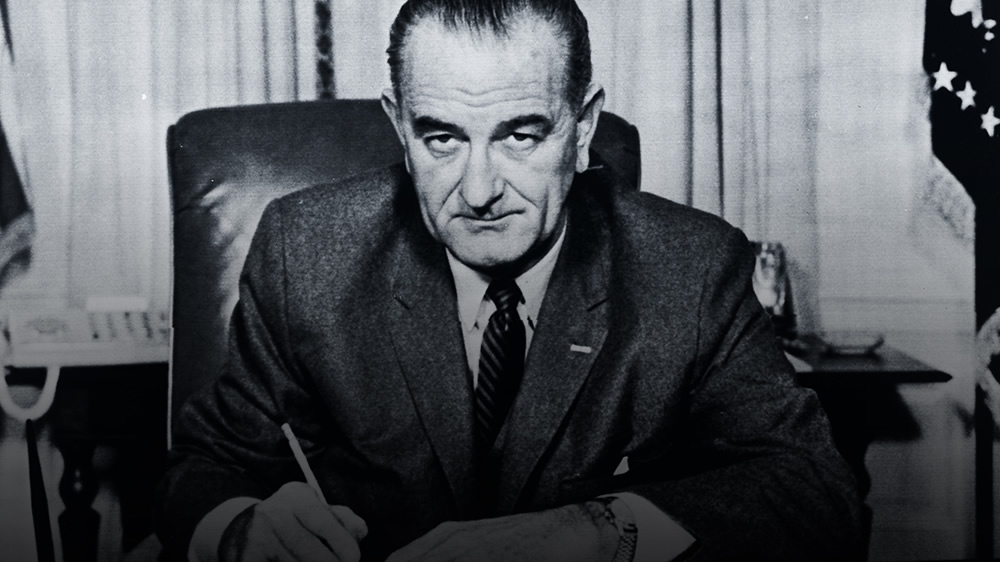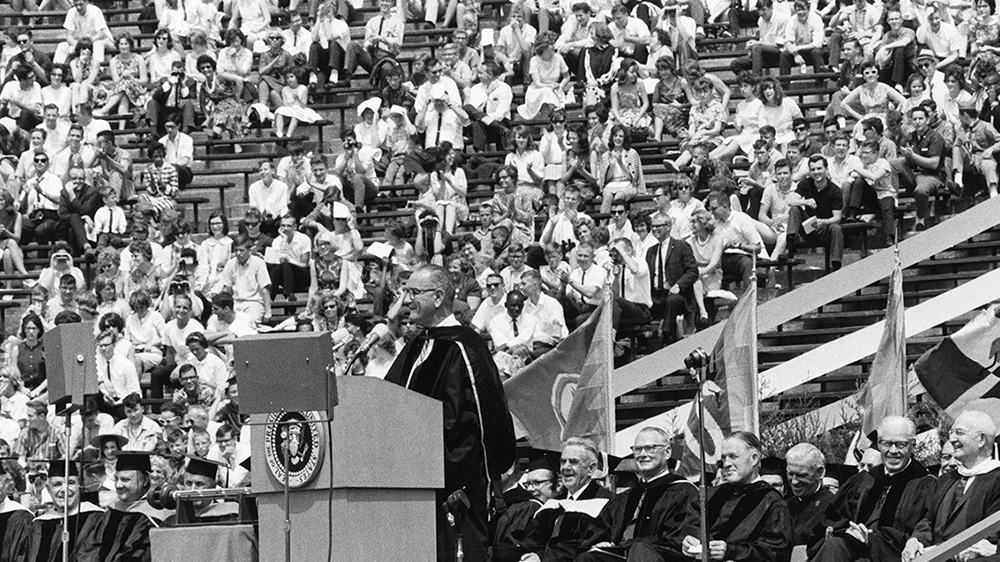The LBJ Presidency in Five Quotes
Lyndon Baines Johnson is the only American to have held all four elected positions of congressman, senator, vice president and president. As the 36th president, Johnson influenced the United States for both better and worse with his Great Society legislation and escalation of the Vietnam War. Here are five quotations from LBJ that encapsulate his tenure in the Oval Office.

1. “On the 20th day of January, in 19 and 61, John F. Kennedy told his countrymen that our national work would not be finished ‘in the first thousand days, nor in the life of this administration, nor even perhaps in our lifetime on this planet.’ ‘But,’ he said, ‘let us begin.’ Today in this moment of new resolve, I would say to all my fellow Americans, let us continue.” —November 27, 1963
Vice President Johnson was only three cars behind President John F. Kennedy in the motorcade when shots rang out in Dallas on November 22, 1963. After Kennedy’s death, Johnson took the oath of office on Air Force One at 2:38 p.m. CST, and his first proclamation the next day was a natural decision: a national day of mourning for his predecessor. In his first speech to Congress five days later, he had the task of memorializing the deceased president and finding a way to move forward with JFK’s agenda so that Kennedy “did not live—or die—in vain.”
2. “The purpose of the law is simple. It does not restrict the freedom of any American, so long as he respects the rights of others. It does not give special treatment to any citizen. It does say the only limit to a man's hope for happiness, and for the future of his children, shall be his own ability.” —July 2, 1964
When President Johnson assumed office in 1963, the Congress had already begun debating a civil-rights bill proposed by JFK after years of protests and actions by African Americans. On his fifth day in office, Johnson urged the legislative branch to pass that bill in “honor of President Kennedy’s memory.” For the next few months, he used his experience in the Senate and Congress to lobby for the act that would outlaw discrimination based on race, color, religion, or national origin in public accommodations and facilities. On July 2, 1964, President Johnson signed the Civil Rights Act of 1964.

3. “The Great Society rests on abundance and liberty for all. It demands an end to poverty and racial injustice, to which we are totally committed in our time. But that is just the beginning.” —May 22, 1964

At a speech at the University of Michigan, President Johnson announced his intention to tackle more than just civil-rights issues. He laid out an agenda to tackle the social issues of poverty, education, healthcare, and transportation as part of his “War on Poverty” and Great Society initiative. Fourteen task forces resulted in major federal programs and offices including Medicare and Medicaid, the National Endowment for the Arts, the Corporation for Public Broadcasting, the Department of Transportation, the National Highway Traffic and Safety Administration, and the Office of Economic Opportunity.
4. “Our government is united in its determination to take all necessary measures in support of freedom and in defense of peace in Southeast Asia.” —August 4, 1964
On August 2, 1964, USS Maddox engaged with three North Vietnam torpedo boats. Two days later, the Navy engaged again with what they thought was another attack. President Johnson took immediate action to retaliate and urged national support on television uttering the words above. The result was the Gulf of Tonkin Resolution, which gave the president the power to use military force in Southeast Asia without a declaration of war by Congress. The Vietnam War escalated dramatically, but Johnson’s rational was based on a lie. The second attack never happened; the Navy had engaged with false radar images. A year later, Johnson admitted to his press secretary “For all I know, our Navy was shooting at whales out there.”
5. “I regret more than any of you know that it has not been possible to restore peace to South Vietnam.” —January 14, 1969
Four years later, despite his legislative victories, Johnson cited the war as the main reason he would not run for re-election. A few days before he left office he gave a final State of the Union to a joint session of Congress and included the above statement.
